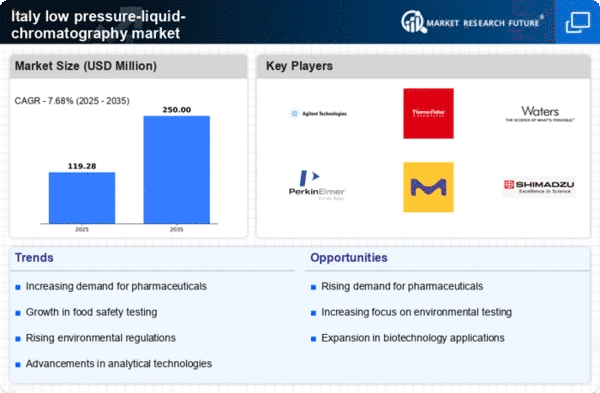Growing Research Activities
The low pressure-liquid-chromatography market in Italy is experiencing a surge in research activities across various sectors, particularly in pharmaceuticals and biotechnology. This increase is driven by the need for advanced analytical techniques to ensure product quality and safety. Research institutions and universities are investing heavily in chromatography technologies, leading to a higher demand for low pressure-liquid-chromatography systems. In 2025, the Italian government allocated approximately €200 million to support research initiatives in life sciences, which is likely to further boost the market. As researchers seek efficient and cost-effective solutions for compound separation and analysis, the low pressure-liquid-chromatography market is positioned to benefit significantly from these developments.
Expansion of Pharmaceutical Manufacturing
The expansion of pharmaceutical manufacturing facilities in Italy is a key driver for the low pressure-liquid-chromatography market. With Italy being one of the leading pharmaceutical producers in Europe, the demand for efficient separation techniques is on the rise. In 2025, the Italian pharmaceutical industry is projected to grow by 5%, necessitating advanced chromatographic methods for drug development and quality control. Low pressure-liquid-chromatography systems are increasingly favored for their ability to handle large sample volumes and provide high-resolution results. This trend indicates a robust growth trajectory for the market, as manufacturers seek to optimize their production processes and ensure compliance with stringent regulatory standards.
Technological Integration in Laboratories
The integration of advanced technologies in laboratories across Italy is a significant driver for the low pressure-liquid-chromatography market. Laboratories are increasingly adopting automation and digital solutions to enhance efficiency and accuracy in analytical processes. The implementation of data management systems and real-time monitoring tools is likely to improve the overall performance of low pressure-liquid-chromatography systems. In 2025, it is anticipated that the market for laboratory automation in Italy will grow by 6%, indicating a strong trend towards modernization. This technological evolution may lead to increased demand for low pressure-liquid-chromatography systems that can seamlessly integrate with these advanced laboratory environments.
Rising Adoption in Food and Beverage Testing
The food and beverage industry in Italy is increasingly adopting low pressure-liquid-chromatography for quality assurance and safety testing. With the growing consumer awareness regarding food safety, manufacturers are compelled to implement rigorous testing protocols. The low pressure-liquid-chromatography market is well-positioned to cater to this demand, as it offers reliable methods for detecting contaminants and ensuring product integrity. In 2025, the Italian food testing market is expected to grow by 4%, further driving the need for advanced chromatographic techniques. This trend suggests that the low pressure-liquid-chromatography market will continue to expand as food and beverage companies prioritize compliance with safety regulations.
Increased Focus on Environmental Sustainability
The low pressure-liquid-chromatography market is also influenced by the growing emphasis on environmental sustainability in Italy. As industries strive to reduce their ecological footprint, there is a rising demand for green chromatography techniques that minimize solvent usage and waste generation. The Italian government has introduced various initiatives aimed at promoting sustainable practices within the chemical and pharmaceutical sectors. This shift towards environmentally friendly methodologies is likely to drive innovation in low pressure-liquid-chromatography technologies, as companies seek to develop more sustainable solutions. The market may see an increase in the adoption of eco-friendly solvents and materials, aligning with Italy's commitment to sustainability.















Leave a Comment